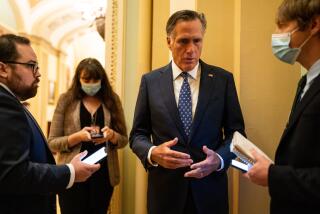Monsieur Camdessus’ Considered Doubt : Is an American recovery impossible under current policy?
U.S. economic policy is of the greatest moment not only to Americans but to the entire world, of course. When the U.S. economy sneezes, some nations get a cold and a lot of others tend to have an anxiety attack, jump in to say Gesundheit and pray for recovery. The health of the U.S. economy is never an American-only worry.
Since mid-1990 the United States has been mired in a debilitating recession whose end point is sadly not yet in sight--and which has become a major issue not only in the U.S. presidential election. For this reason, the highly respected managing director of the International Monetary Fund has expressed serious reservations about current U.S. monetary policy. In a speech in Washington Wednesday that is raising eyebrows both here and abroad, Michel Camdessus marked the United States for criticism.
The Camdessus critique is that any economic policy that relies heavily on artificially lowered interest rates to stimulate recovery is doomed to failure if that economy is suffocating from chronic government deficits. In remarks to the board of governors of the IMF and the World Bank, which are excerpted today on our Op-Ed page, Camdessus suggests that trying to bail out a faltering economy by pushing down benchmark interests, instead of moving to at least reduce the level of debt servicing that has accrued because of a gigantic deficit, is like trying to bail out the proverbial leaking boat with a teacup.
Camdessus’ warning deserves to at least be debated and considered at government’s highest levels. After all, the Federal Reserve Bank has engineered the reduction of benchmark U.S. interest rates by four percentage points over the last two years and the economy is still in the mud. Perhaps interest-rate reliance, which this newspaper and many other observers hoped would work, is ill-conceived.
If so, that would be at odds with the policies of the Bush Administration, which has relied so much on the efforts of Federal Reserve Board Chairman Alan Greenspan to lower interest rates to stimulate the economy. Indeed, Greenspan would appear to have been under extraordinary White House pressure to do that. According to a report Wednesday by Times staff writer James Risen, senior Administration officials met privately with Greenspan to lobby him to aggressively cut interest rates. These meetings took place in the spring and early summer of 1991, when Greenspan’s first term as Fed chairman was expiring and he was up for reappointment.
It is hardly unusual for White Houses--whether Republican or Democratic--to try to have their way with the nation’s central bank, which was established as an independent agency precisely to insulate it from such pressure. And indeed it is highly debatable whether America would ever want to have a central bank so self-absorbedly independent as, say, Germany’s Bundesbank. But the character and timing of the intervention ring alarm bells.
Those alarms will prove to be all the more valid if it turns out that the White House was pressuring the Fed chairman to pursue policies that were fundamentally ill-conceived. The issue here is not only of process (shouldn’t the Fed have a healthy measure of breathing room?) but of substance (are monetary policies the answer?). The sad truth is that the Bush Administration has not provided an adequate sense that such issues have been properly and thoroughly considered.
More to Read
Sign up for Essential California
The most important California stories and recommendations in your inbox every morning.
You may occasionally receive promotional content from the Los Angeles Times.










